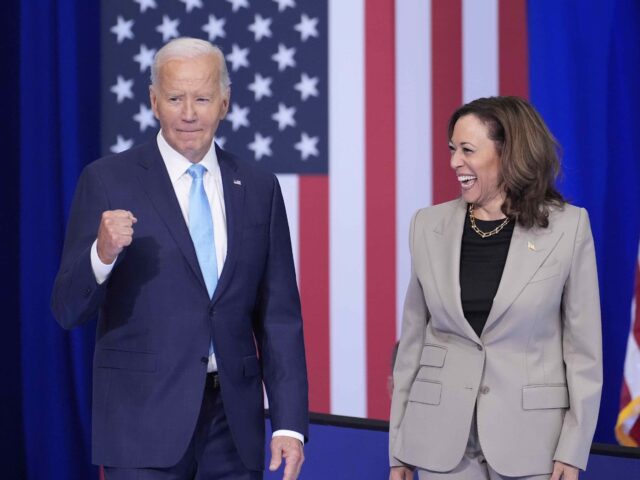|
Getting your Trinity Audio player ready...
|
The Biden-Harris administration on Monday unveiled sweeping new sanctions on Israeli Jews, just days after it awarded another $230 million in taxpayer funds to the Palestinians. The back-to-back announcements signal that diplomatic relations between Israel and the outgoing White House will continue to sour until President-elect Donald Trump retakes office next year.
The new sanctions are the broadest to date, imposing unprecedented punitive measures on three Israeli organizations the administration accuses of fomenting violence against Palestinians in the West Bank. They were leveled just days after a coalition of nearly 90 congressional Democrats petitioned the Biden administration to ramp up sanctions on Israel before leaving the White House.
The sanctions were announced just three days after the Biden-Harris administration awarded another $230 million in funding for humanitarian projects in the West Bank and the Hamas-controlled Gaza Strip. The American government has now sent more than $2 billion in taxpayer funds to the Palestinians since Hamas’s Oct. 7 terror spree on Israel—even as critics warn this cash is keeping Hamas on life support.
The administration’s last-minute offensive against Israel is certain to appease the Jewish state’s detractors in Congress and the State Department. But its impact will likely be short-lived, given Trump’s pro-Israel instincts and a Republican majority in Congress that can immediately freeze American aid to the Palestinians.
“They took a campaign break from scapegoating the Jews, but now that Kamala has lost, the State Department’s intifada caucus is back in charge during the Biden going out of business sale,” said one senior GOP congressional source.
In announcing the $230 million aid infusion, the United State Agency for International Development (USAID) said its “commitment to the Palestinian people remains steadfast.”
“This funding demonstrates our resolve to support sustainable development and provide essential services that enhance the quality of life for all Palestinians and further reduce the influence of Hamas,” Amy Tohill-Stull, USAID’s mission director in the West Bank and Gaza, said in a statement.
The cash will support “economic recovery and development programs in the West Bank and Gaza,” including private sector initiatives, as well as “civil society strengthening, youth empowerment and education, and community level priorities.”
As American cash flows into the Gaza Strip, Jewish Israelis living in the West Bank are facing sanctions that will cut off their access to the international banking system and freeze their incomes.
The latest sanctions target Eyal Hari Yehuda Company LTD, Itamar Yehuda Levi, Shabtai Koshlevsky, and Zohar Sabah. The Israeli company provides pickup trucks and other vehicles used to build what the State Department calls illegal settlements.
Koshlevsky is the vice president of another recently designated Israeli group, Hashomer Yosh, which provides aid to farmers in the West Bank. The State Department claims the organization and its leaders are guilty of fomenting violence against Palestinians living in the area.
All of these groups and individuals, the State Department maintains, “engaged in threats and acts of violence against Palestinians, including in their homes, and demonstrated a pattern of destructiveness in the West Bank.”
The Treasury Department, in a coordinated effort, announced additional sanctions on Monday against Amana, an Israeli group that develops Jewish areas in the West Bank. The Biden-Harris administration says the group is the “largest organization involved in settlement and illegal outpost development in the West Bank.”
Amana, the State Department said, “has established dozens of illegal settler outposts and directly engaged in dispossession of private land owned by Palestinians in its support of settlers.”
Regional analysts say the Biden-Harris administration is misusing American sanctions in an unprecedented bid to target Jews with opposing political views.
“Usually, sanctions target those responsible for severe wrongdoing, such as terrorist financing, nuclear proliferation, and large-scale human rights abuses,” the Foundation for Defense of Democracies (FDD) think tank wrote in an analysis published Monday. “The new sanctions break this mold by targeting Israeli Jews in the West Bank accused of property crimes and vandalism, or of simply associating with the wrong people.”
The Biden-Harris administration’s sanctions list was built with the support of anti-Israel NGOs, including “the Muslim Brotherhood-tied DAWN MENA, a radical anti-Israel nonprofit,” according to the analysis from FDD’s Mark Dubowitz and Eugene Kontorovich. “This means the U.S. is punishing Israelis based on allegations from those who believe the Jewish state has no right to exist.”
While Trump can undo most of the moves upon taking office, “a new precedent has been set: The U.S. government is mainstreaming the goals of the anti-Israel left’s Boycott, Divestment, and Sanctions campaign,” Dubowitz and Kontorovich wrote.
The Washington Free Beacon first reported in June that the Biden-Harris State Department assembled an internal “report card” on Israeli activities in the West Bank, largely based on data from organizations tied to the anti-Semitic Boycott, Divestment, and Sanctions movement.
Additionally, on Election Day, the Biden-Harris administration informed Congress that it is waiving mandatory terrorism sanctions on the Palestinian government, even though it was still found to be paying imprisoned terrorists and fomenting terrorism.




